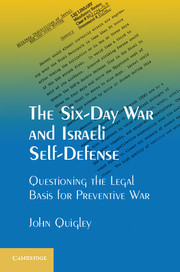Book contents
- Frontmatter
- Contents
- Preface
- Note on Official Documents
- Abbreviations
- The Six-Day War and Israeli Self-Defense
- Part One A War is Generated
- Part Two Cold War Togetherness
- Part Three The First Victim of War
- Part Four Rallying Round Self-Defense
- 13 How to Read the Silence on Aggression
- 14 The Experts Fall in Line
- 15 No Threat? No Matter
- Part Five War Without Limit?
- Part Six Peace Sidelined
- Notes
- Bibliography
- Index
13 - How to Read the Silence on Aggression
Published online by Cambridge University Press: 05 February 2013
- Frontmatter
- Contents
- Preface
- Note on Official Documents
- Abbreviations
- The Six-Day War and Israeli Self-Defense
- Part One A War is Generated
- Part Two Cold War Togetherness
- Part Three The First Victim of War
- Part Four Rallying Round Self-Defense
- 13 How to Read the Silence on Aggression
- 14 The Experts Fall in Line
- 15 No Threat? No Matter
- Part Five War Without Limit?
- Part Six Peace Sidelined
- Notes
- Bibliography
- Index
Summary
The defeat of the Soviet draft resolutions was taken by a number of legal analysts as an exoneration of Israel. Stephen Schwebel, then a professor at Johns Hopkins University, declared that the defensive character of Israel's action was “suggested” by the fact that “despite the most intense efforts by the Arab states and their supporters, led by the Premier of the Soviet Union, to gain condemnation of Israel as an aggressor by the hospitable organs of the United Nations, those efforts were decisively defeated.” Julius Stone said that any doubts about the legality of Israel's action “would have to be regarded as resolved in favour of the State of Israel by the rejection by the majorities in the Security Council and the General Assembly of all resolutions charging aggression by Israel.” Yehuda Blum, professor at Hebrew University in Jerusalem, wrote that “the often-repeated Arab-Soviet charge of ‘Israeli aggression’ in June 1967 was not accepted either by the Security Council or the General Assembly.”
As Israel abandoned its initial claim that Egypt had struck first, the defeat of the Soviet resolutions came to be seen as an indication that the international community regarded Israel as having acted lawfully in anticipatory self-defense. Stuart Malawer, a US international lawyer, said that Israel's argument was one of anticipatory self-defense and that it was “implicitly accepted by the General Assembly, by its failure to condemn Israel for her attack, despite the urging of the Arab states and the Soviet Union.” Eban, of course, had relied in the General Assembly on an actual Egyptian initial attack.
- Type
- Chapter
- Information
- The Six-Day War and Israeli Self-DefenseQuestioning the Legal Basis for Preventive War, pp. 115 - 119Publisher: Cambridge University PressPrint publication year: 2012



